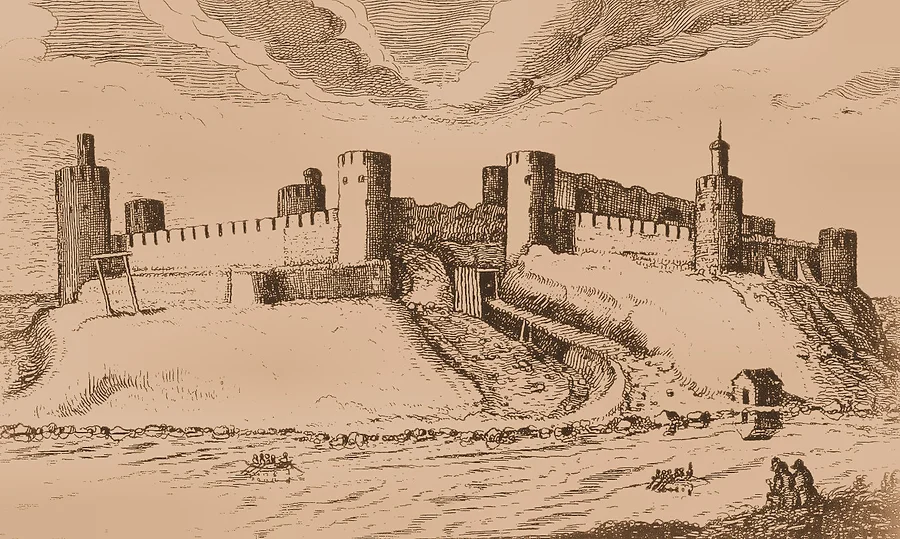Feodor Aminoff
Feodor Grigorevitj Aminev, son of Grigorij Michailovitj Aminev, was supposedly born in the 1560's. Feodor belonged to the bojarskij deti, a group of the Russian civil service aristocracy who had owned smaller estates and had been quite affluent. In february 1609, Feodor, who at the time was the commander of the steltsy units at the Ivangorod fortress, was captured by the Swedish governor of the fortress of Narva. When this reached the ears of King Charles IX of Sweden, he decided to take advantage of Feodor in his quest to seize Ivangorod. In return for being released from his captivity, Feodor had to give his promise to try his best to help the ally of Sweden, Czar Vasily, to get the authority not only over Ivangorod, but also over the fortresses of Yamburg and Koporye. In spite of the fact that Feodor had been known as one of Ivangorod's most eager supporters of the throne pretender Dimitrij, it wasn't difficult for the Swedes to persuade Feodor to concent to the plan. Prior to the breakthrough of the nationalism in the 19th century it was not uncommon to choose to serve another authority in favor of the one you were belonging under, if that would be of advantage.
When Feodor’s attempts to negotiate did not lead to the outcome the Swedes were hoping for, Evert Horn was sent on a military expedition against the fortresses near the border in the summer of 1612. Feodor, amongst others, was sent to Gdov to "harass the defenders of the fortress". In consequence, both Feodor's wife Audotja Pahomovna Lomakov and their children, who apparently were in Gdov at the time, were captured and robbed of all their belongings. When Horn began the siege of the fortress in early July 1618, he decided to send Feodor to persuade them to surrender to the Swedes. Feodor succeeded in his quest; Gdov surrendered in the middle of July. Following the surrender of the fortress Feodor was, according to statements made y himself, appointed governor of Gdov, but had to leave the fortress when Horn summoned him to Ivangorod, where the siege of the fortress begun on the 23rd of August. Feodor was put in charge of troops consisting of Russian noblemen and men from the provinces occupied by Sweden. Not only did he participate in the battles along with these men, on top of that he was also sent to negotiate with the fortress six times, trying to persuade them to surrender. In the end he managed to convince them to capitulate with all of their supplies. Afterwards Feodor was, according to information given by himself, appointed governor of Ivangorod. In documents from 19th July 1614, Feodor is mentioned as the under-governor of Ivangorod.
After the seize of Ivangorod Feodor Aminev entered service in the Swedish army. In 1613 Gdov had fallen into the Polish hands. Feodor participated in the recapture of the fortress in September 1614 under the command of King Gustav II Adolph. Shortly afterwards Feodor was designated governor of the fortress, a post he held until the year 1617. In 1615, Feodor was also appointed the auditor of Ivangorod, Yamburg, Koporye, Augdov and Somerske together with his son-in-law, Mikita Kalitin. After the death of Evert Horn in 1615, Anders Eriksson Hästehufvud was designated governor of Ivangorod and Yamburg, but in 1617 an Russian-speaking governor was also appointed at Ivangorod. Feodor, who was chosen for this task, left his office at Gdov. On September 24th in 1618 King Gustav II Adolph gave him a letters patent in the castle of Stockholm, granting him a place amongst the Swedish nobility. His surname was changed from Aminev to Aminoff. The family was introduced at the House of Nobility in Stockholm the 9th of October in 1650 with the number of 446 (which later was changed into the number of 456).
Feodor played a big part in repopulating Ingria after the war had ended with the Treaty of Stolbovo in 1617. Like other Russian noblemen who had decided to enter Swedish service, Feodor acted as a middleman both between the authorities and the locals, as well as the Swedish and the Russian culture. Feodor was given the task of preventing both Russian noblemen, townspeople and the peasantry from leaving Ingra. He also tried attracting farmers to the area. A part of the Ingrish territory was however reserved for the maintenance of the fortresses in the area, thus reserving these areas for the crown. This lead to extensive redistribution of the territories of those who's property was situated on these grounds. Feodor was one of those who was most affected by this. He was however very highly ranked among the Russian noblemen who had decided to enter Swedish service. This is proven by a letter from King Gustav II Adolph to Hästehufvud, the governor of Ingria, where Feodor is mentioned. He wasn't only receiving his lawful compensation for the grounds he had been forced to give up, in addition to that he was also allowed to keep his wilds in Koporye for the rest of his life. His descendants was also granted the permission to apply for compensation for those villages Feodor had given up in Jama. He received these compensations partly due to the fact that he had "strengthened the obedience of the rest of the Russian noblemen".
One can assume that Feodor stayed at his office as the governor of Ivangorod until his death. According to his sons, Feodor would have died in 1627. Documents from Dorpats hovrätt (the Royal Court of Dorpat) does however state that Feodor did sign his last will and testament in the year of 1628. He is presumed to have died shortly afterwards.

The fortress of Ivangorod in 1616,
Wikipedia commons
